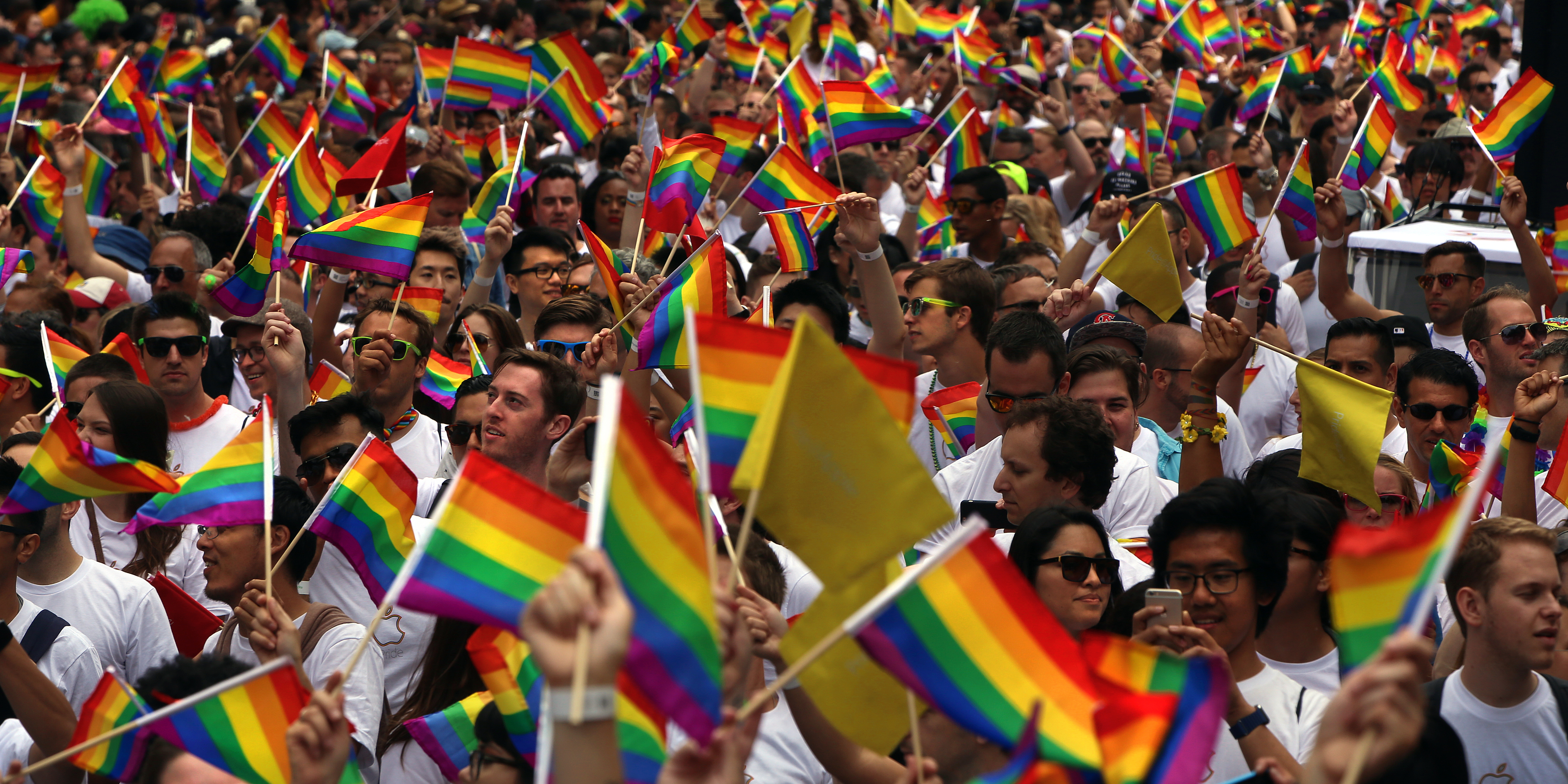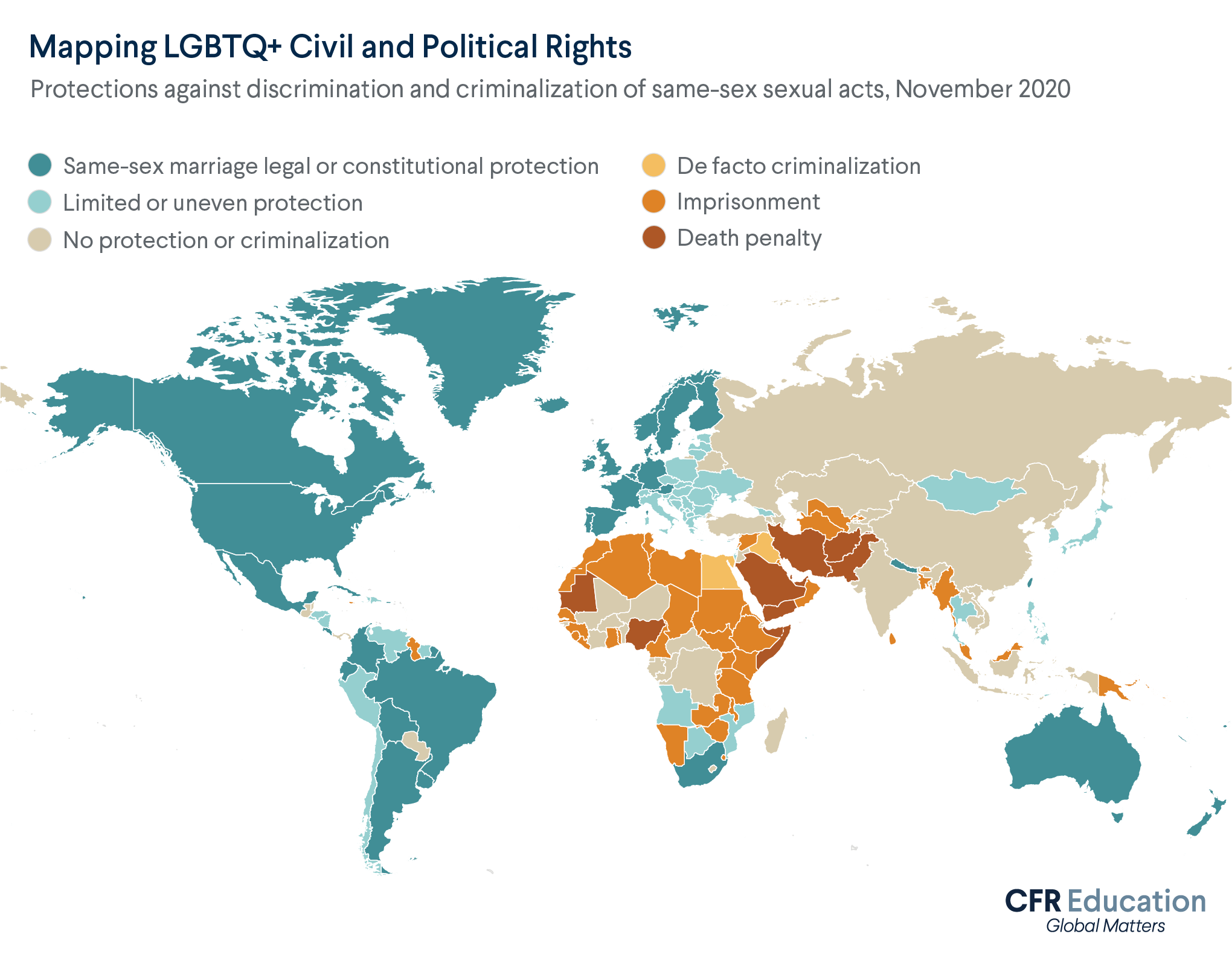Marriage Equality Around the World
An increasing number of countries recognize same-sex marriage, but discrimination and persecution persist.
Did you know that Ireland almost criminalized heterosexual marriage in 2015?
What unfolded was less an attack on the institution of marriage and more a simple—yet almost significant—error in translation.
That year, a national referendum asked the country whether to amend the constitution to permit same-sex marriage. The English text said, “Marriage may be contracted in accordance with law by two persons without distinction as to their sex.” However, the Irish-language text could be read as saying, “A couple may, whether they are men or women, make a contract of marriage in accordance with law.”
Some people worried that, if passed, the Irish-language text would have only permitted marriage between two people of the same sex and inadvertently outlawed heterosexual marriage in the process.
Recognizing that ambiguity, the Irish government quickly updated the language. Ultimately, the revised referendum passed with an overwhelming majority, making Ireland the world’s first country to legalize same-sex marriage by popular vote.
As of April 2023, thirty-three countries afford same-sex couples the same right to marriage as heterosexual couples. However, those countries still decisively remain the minority. In most countries, marriage equality does not exist. Additionally, same-sex couples experience frequent discrimination and persecution.
This resource will explore the importance of marriage equality and the state of that right around the world.
Why is marriage equality important?
Many countries and international organizations recognize the right to marry as an essential freedom and a fundamental civil and human right.
Proponents of marriage equality argue that same-sex couples should have the same rights as heterosexual couples. Advocates assert that all people should have access to marriage's legal benefits. Therefore, the denial of marriage equality and, thus, access to marriage’s legal benefits is inherently discriminatory.
Let’s explore some of marriage's benefits.
Financial benefits: Many countries provide married couples tax privileges, insurance benefits, inheritance, and property rights. Moreover, marriage enables shared access to government welfare services, and the right to jointly open bank accounts.
Medical benefits: Marriage equality allows partners to make medical decisions for one another if one partner falls ill or becomes incapacitated.
Family benefits: Certain countries allow only married couples to foster or adopt children. Additionally, marriage equality allows couples to share child custody if a relationship ends in divorce.
What is the state of marriage equality around the world?
The Netherlands became the world’s first country to legalize same-sex marriage in 2001. Since then, many other countries such as Andorra and Slovenia have established that right. Today, the total number of countries with marriage equality is thirty-three.
That figure increases when factoring in nations that allow same-sex civil unions and registered partnerships. This Legal status provides couples who live together with limited protections, rights, and benefits.
Most countries that recognize same-sex marriage are in Western Europe and the Western Hemisphere. The research and advocacy group Freedom House classifies nearly every country with marriage equality as “free.” This classification means that they have strong records protecting political rights and civil liberties. However, not every free country recognizes same-sex marriage.
Experts also find a strong correlation between the strength of a country’s economy and its attitude toward marriage equality. One study from the University of North Carolina at Chapel Hill [PDF] found that the Latin American countries most supportive of LGBTQ+ rights are also the region’s richest, most urbanized, and most middle-class countries.
How do countries achieve marriage equality?
Typically, countries have two main paths—legislative and judicial—toward achieving marriage equality.
Twenty-four countries have legalized same-sex marriage through the legislative process, meaning that elected representatives have passed bills establishing that right. In the case of some countries like Ireland and Switzerland, legislators have legalized same-sex marriage after national referenda demonstrating public support for marriage equality.
Research shows that the election of LGBTQ+ legislators plays a significant role in passing marriage equality bills. One study found that national legislatures with openly identifying LGBTQ+ lawmakers are fourteen times more likely to have marriage equality or civil partnerships than those without such members.
Eight countries have legalized same-sex marriage through the judicial process. In most of those cases, courts ruled that provisions in their countries’ constitutions supporting the right to privacy and equal treatment protect the right to same-sex marriage. The U.S. Supreme Court, for instance, declared same-sex marriage legal in all fifty states in the landmark 2015 decision Obergefell v. Hodges. In this case, the Supreme Court pointed to the Equal Protection Clause of the Constitution’s Fourteenth Amendment.
Lastly, South Africa—the one country in sub-Saharan Africa with marriage equality—legalized same-sex marriage in 2006 by passing legislation after the country’s courts mandated it do so.
Although international courts have limited ability to enforce their decisions, their rulings can influence domestic conversations around marriage equality. In 2018, for example, the Inter-American Court of Human Rights encouraged its members to work toward marriage equality. Following this advisory opinion, Costa Rica and Ecuador subsequently legalized same-sex marriage.
What about the rest of the world?
Despite recent advances toward legalizing same-sex marriage, such equality remains the exception.
Sixty-four countries criminalize same-sex relations between consenting adults. Some of those countries—such as Iran and Saudi Arabia—impose the death penalty for such relationships.
Experts find a strong connection between autocracies and restrictions on LGBTQ+ rights. Such governments typically restrict individual rights and liberties such as freedom of speech, assembly, and expression. Additionally, activists advocating and organizing for marriage equality in illiberal countries often face censorship and threats of violence. In 2021, for instance, Ghanaian police arrested twenty-one activists for supposedly advocating for LGBTQ+ rights.
However, authoritarian governments are not the only ones that limit the rights of same-sex couples. Democracies, particularly those with strong influences from institutionalized religion, lag behind peer countries in legalizing same-sex marriage. For instance, countries such as Italy and Greece have legalized civil unions but not same-sex marriage. Experts believe such marriage policy may be the result of strong ties to the church.
Europe largely sees an East-West divide in attitudes toward marriage equality, resulting in what some experts call the rainbow curtain—a reference to the Iron Curtain that divided the continent during the Cold War. Many Western European countries have legalized same-sex marriage, but few former communist countries have done so. Slovenia made history in 2022 as the first country of the former Yugoslavia to legalize same-sex marriage. According to a recent poll, 90 percent of Russians oppose same-sex marriage, while more than 85 percent of those in the Netherlands and Sweden support it. The European Union encourages its members to recognize same-sex marriage or civil unions. However, the EU does not force member countries to make constitutional provisions to achieve marriage equality. It does, however, protect same-sex couples’ rights to freedom of movement and residence.
To learn more about regional trends, check out Marriage Equality: Global Comparisons.
What are future trends for same-sex relationships?
Although many countries have legalized same-sex marriage in recent years, others have taken steps in the opposite direction. In 2021, Hungary passed a law banning the "display and promotion of homosexuality" to minors. Meanwhile, activists in the United States worry that an increasingly conservative Supreme Court could soon revisit and potentially overturn Obergefell v. Hodges. Such fears intensified following the court’s willingness to strike down precedents such as the right to a legal abortion.
Even countries that allow same-sex marriage do not necessarily guarantee true equality under law. Married same-sex couples in countries like Ecuador lack certain rights afforded to heterosexual couples, such as the right to adoption.
Moving forward, many LGBTQ+ activists argue that their movements should focus not just on achieving marriage equality but rather also on reducing violence and discrimination. In that regard, organizers have had significant success. More and more countries are issuing protections against discrimination based on sexual orientation in the workplace. However, those protections still do not exist in most countries.
The world has a long way to go toward eliminating violence and discrimination based on sexual orientation, but the twenty-first century has already revealed that significant progress is attainable.

